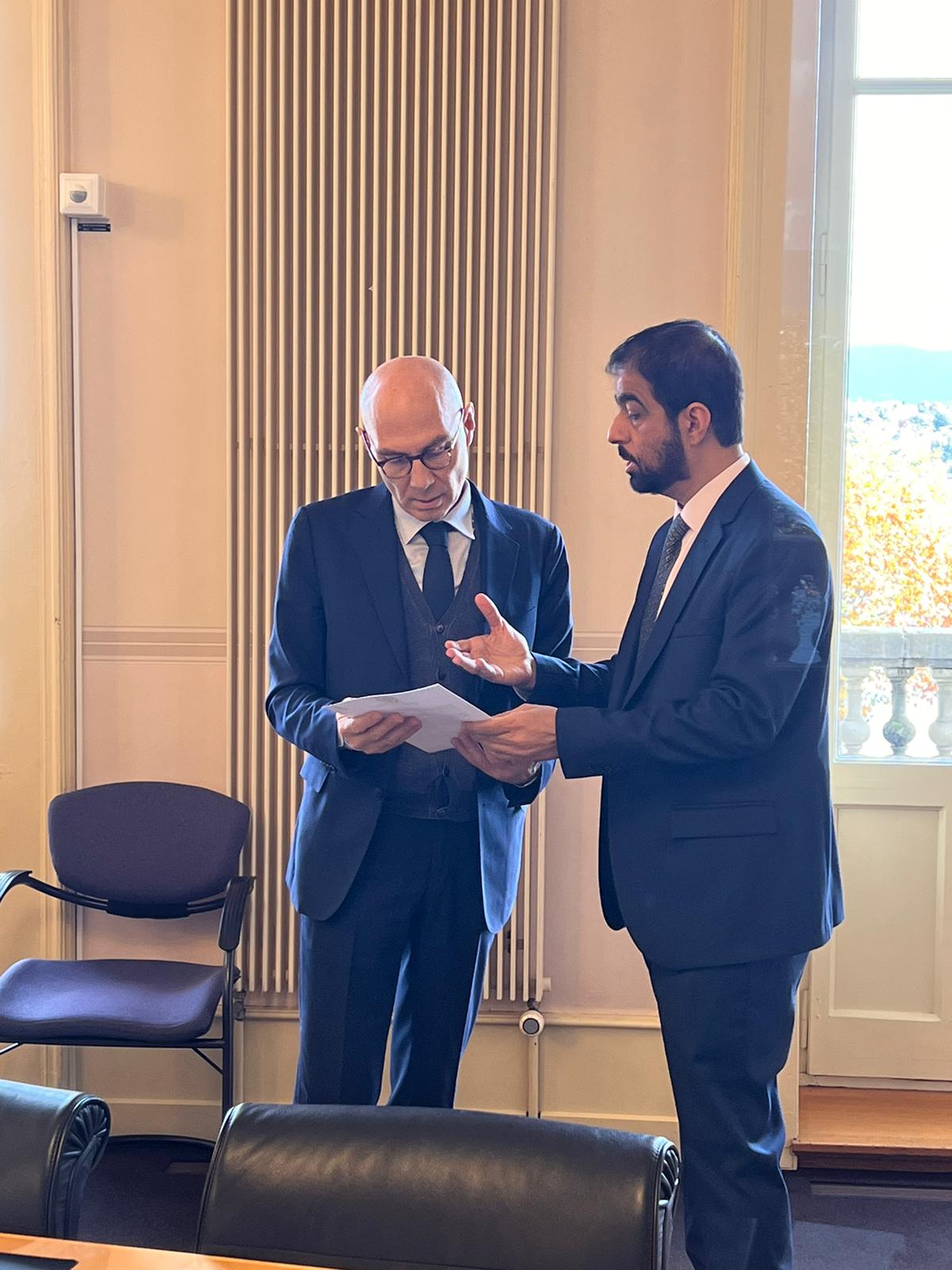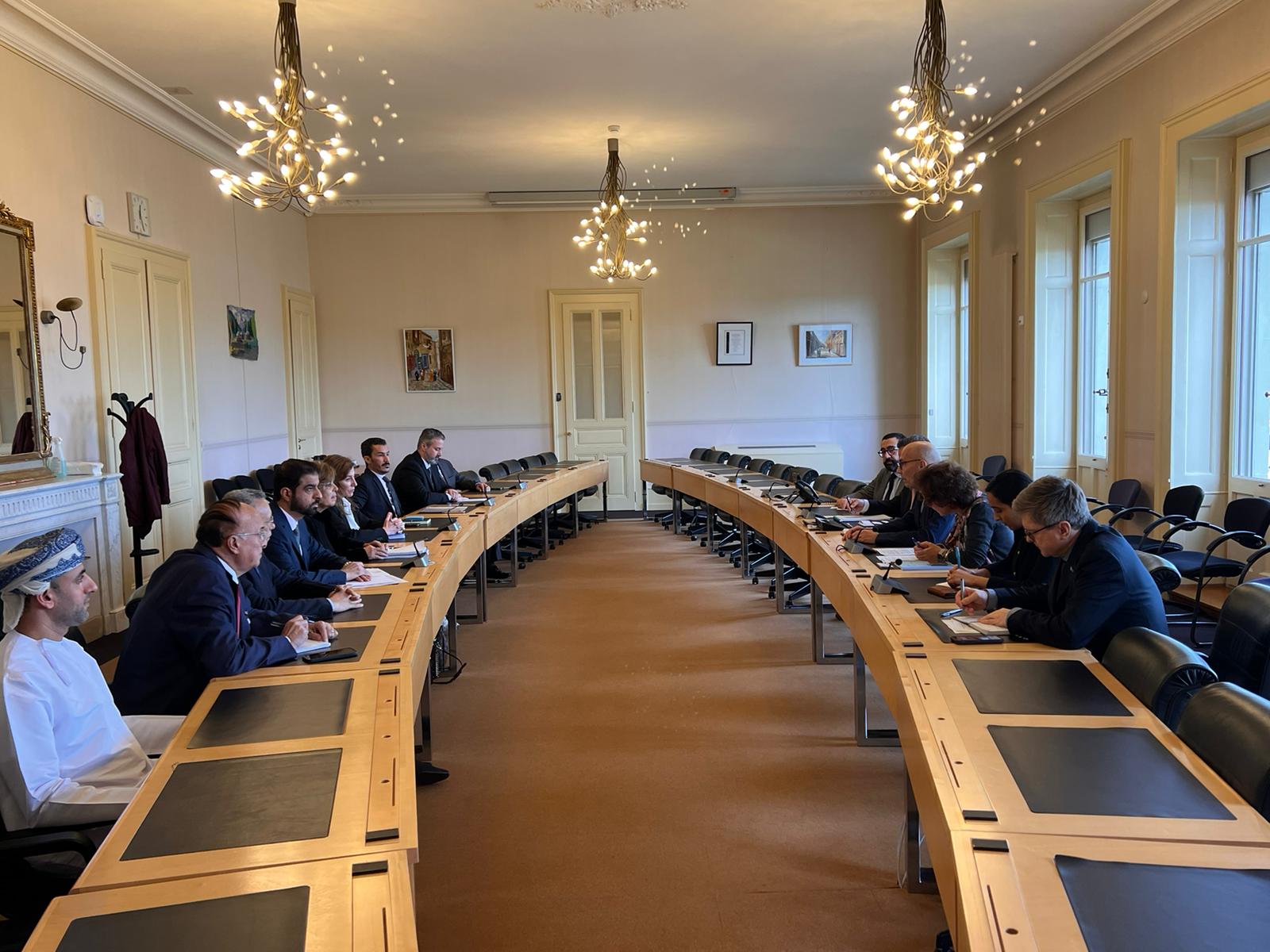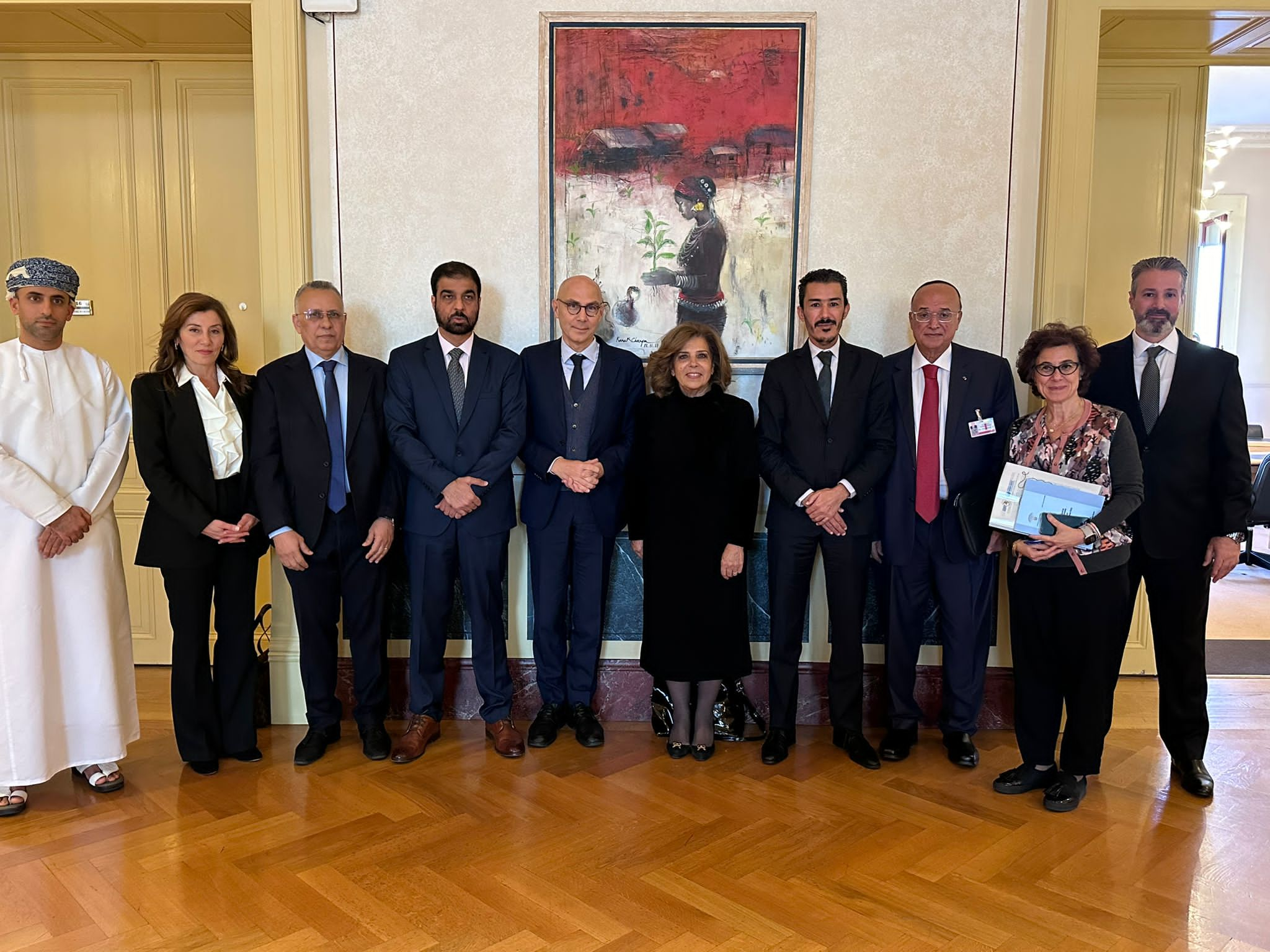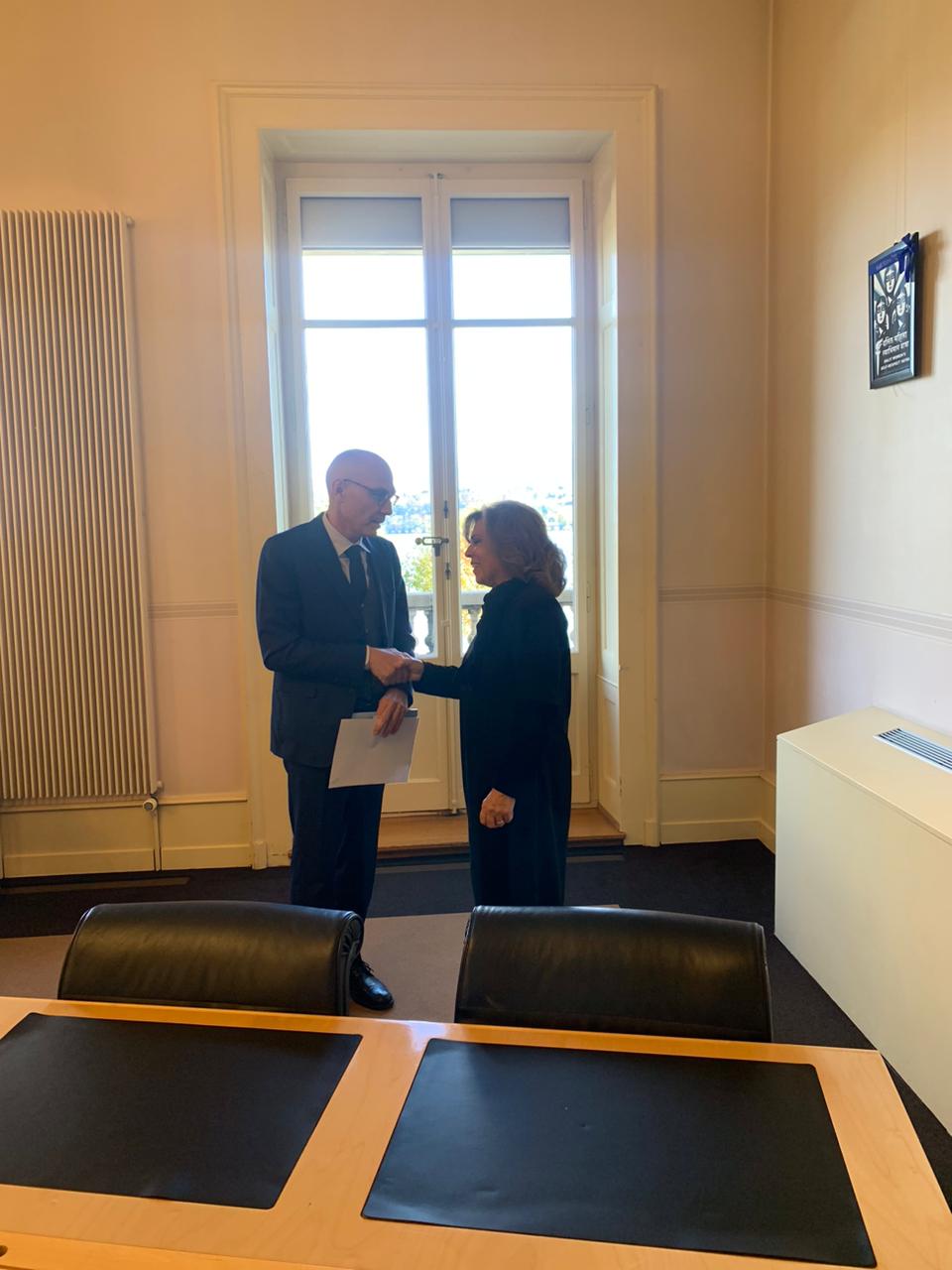Press release of the meeting of the delegation of the Arab Network of National Human Rights Institutions with the High Commissioner for Human Rights in Geneva to discuss responses to developments in the situation in Gaza
Today, November 15, 2023, the High Commissioner for Human Rights, Mr. Volker Türk, received at the Commission’s headquarters in Geneva a delegation from the Arab Network for National Human Rights Institutions, headed by Ambassador Dr. Moushira Khattab, President of the Arab Network for National Human Rights Institutions and President of the National Council for Human Rights, and Mr. Sultan Al-Jamali, Secretary-General of the Arab Network for National Human Rights Institutions and Secretary-General of the National Human Rights Committee in Qatar, to discuss responses to developments in the situation in Gaza.
Ambassador Dr. expressed Moushira Khattab, President of ANNHRI, expressed at the beginning of the meeting her thanks to Mr. Volker Türk for receiving ANNHRI delegation in light of the current international tension, and for visiting the region and meeting with its officials, stressed that this meeting is being held at a critical time for human rights at the international level, as millions in Gaza and other regions face horrific challenges. She stressed the urgent need for cooperation to end the violence and ensure unrestricted access to affected areas, and stressed the importance of promoting and protecting human rights for all equally.
On the other hand, Mr. Sultan Al-Jamali, Secretary-General ANNHRI, referred to the positions of the High Commissioner for Human Rights, called for an investigation into the intense Israeli air strikes with high-impact explosives in areas with high population density, calling for immediate protection for Palestinians in the West Bank by the Israeli occupation, and confronting hate speech and incitement against the Palestinians, demanding for an immediate ceasefire in Gaza and the Israeli attacks on hospitals in Gaza and the surrounding areas. In the context of current developments, Al-Jamali called on the High Commissioner for Human Rights to urgently cooperate with all concerned parties and exert strong
pressure, given its prominent role as a specialized agency within the United Nations to promote and protect human rights, with the aim of achieving: an immediate cessation of the aggression against the Gaza Strip, and contributing to holding the perpetrators accountable Israeli war crimes, affirming the commitment of the occupying Israeli authority to international law, integrating efforts to establish safe corridors for the entry of relief agencies and their workers, immediately stopping grave violations in the West Bank, and cooperating in updating the list of companies participating in the construction of illegal settlements, in accordance with the Human Rights Council resolution. Mr. Sultan Al-Jamali handed over to the High Commissioner a letter containing the demands of the Arab Network for National Human Rights Institutions regarding the situation in Gaza and occupied Palestine.
For his part, Mr. Ahmed Salem Bouhabini, Chairman of the National Human Rights Commission in Mauritania, stressed that the Arab national human rights institutions represented in this meeting hope that the United Nations system will be up to the responsibility, and he explained that all citizens have the right to enjoy their basic rights equally, what is happening today in Gaza is likely to affect the credibility of the international human rights movement, which is based on international law that must be applied to everyone precisely and under the same circumstances.
Ms. Samar Al-Haj Hassan, Chair of the Board of Trustees of the National Center for Human Rights in the Hashemite Kingdom of Jordan, also confirmed that the United Nations was established with the aim of achieving peace and justice, and defending human rights. National human rights institutions work closely with the High Commissioner Office for Human Rights to defend the universal and humanitarian principles of human rights. She indicated that statements and condemnations alone are not enough by United Nations institutions, and that pressure must be exerted on countries to stop this aggression and crimes committed by Israel, which constitute a flagrant violation of all human rights conventions.
For his part, Mr. Mounir Ben Saleh, Secretary General of the National Council for Human Rights in the Kingdom of Morocco, expressed his thanks to the High Commissioner for Human Rights for receiving the delegation of the Arab Network. Ben Saleh also assured the High Commissioner that ANNHRI and the national human rights institutions, especially those that have received accreditation “A", remains at his disposal as part of the United Nations human rights system, which he heads. In this regard, he confirmed that the Palestinian NHRI would share with him via ANNHRI its reports regarding current violations. He affirmed his support and solidarity with the Independent Commission for Human Rights in Palestine, noting the great pressures faced by its members and workers. He called on the High Commissioner for Human Rights, as human rights defenders, to protect human rights equally for all.
Ambassador Mahmoud Karem, Vice President of the National Council for Human Rights in Egypt, mentioned the importance of current Arab public opinion, which lives and is affected by the oppressive and painful conditions experienced by the Palestinian people in Gaza by civilians and inhumane Israeli practices, and called on the international community and the High Commissioner for Human Rights to stop and condemn this killing and punishment. Mass and forced displacement, which contradicts the provisions of international law and international humanitarian law, explaining that the successive acts of Israeli aggression and destruction of Gaza are a clear violation of the provisions and purposes of the United Nations Charter, international legitimacy and United Nations resolutions, and pointed to the double standards that live in the heart of Arab citizens everywhere and which they witness every day. He sees with his own eyes what some countries are calling for to be implemented in Ukraine and completely ignored in Gaza. There is no other way but to stop military operations and Israeli aggression and ensure the security of the people of Palestine and the entry of humanitarian aid. Ambassador Karem also expressed his regret at what is happening in our Arab region and the Palestinian territories,
which are turning into a testing field for some countries’ arsenals of new deadly weapons that are close to weapons of mass destruction.
Dr. Saleh Hamad Al Barashdi, member of the Omani Human Rights Commission, also thanked the High Commission for the opportunity to meet with the Arab Network delegation, and stressed his support for all the points raised by members of the Network delegation, as well as for its letter delivered to the High Commissioner.
A number of members of the delegation of the Arab Network for National Institutions for Human Rights also confirmed: In their view, the High Commissioner for Human Rights is a protector of human rights, expecting him to carry out the tasks of this role more effectively, in accordance with the facts in the reports of the High Commissioner on violations in the Gaza Strip, as well as in accordance with the positions of a number of United Nations mechanisms, stressing that the word has its power and the position. Its effective effect contributes to silencing weapons and stopping aggression. This was when they were issued by those concerned with protecting and promoting human rights in the United Nations system, led by the High Commissioner for Human Rights, as he is the first defender of human rights, “a position that may pay its price,” confirming that Arab national human rights institutions will follow him and support his endeavors, and their readiness to cooperate with a member The Arab Network “Independent Commission for Human Rights in Palestine” calls for fighting with him, advocating for him, and playing any role that supports his efforts regarding stopping the aggression against the Gaza Strip and all of the occupied Palestinian territory and ending the occupation. We hope that the High Commissioner will take a stricter stance regarding human rights violations in the Gaza Strip, based on human rights considerations only.
For his part, the United Nations High Commissioner for Human Rights, Mr. Volker Türk, stressed that these are common concerns and expressed his appreciation for the vital work carried out by national human rights institutions and NNHRI. The High Commissioner stressed that the situation requires an immediate cessation of violence, while granting the United Nations and other entities have unrestricted access to conflict areas. He pointed to the importance of influencing public opinion through the media and platforms that can make a difference. The Commissioner stressed the importance of shared responsibility, stressing that this responsibility transcends political borders, requiring united efforts to end violence quickly and advocate for the rights, security and safety of all affected individuals.





 English
English
 Arabic
Arabic
 French
French



